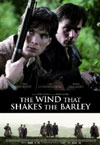|

Reading
two reviews online from both websites, bbc.co.uk/movies and
Empireonline.com, on the 2006 film The Wind That Shakes the
barley, which is directed by Ken Loach. Itís also the winner
of
Palme d'Or at Cannes '06.
Here I have analysed the differences and similarities
between both short reviews on this 2006 film by two
reviewers.
Damon Wise the reviewer on the empireonline website, who has
reviewed this film, has touched the subject In his review,
also has a general knowledge on the subject, which is about
the Irish war of independence 1919-1920, and the Irish civil
war 1922-1923. He explains the different political ideology
of two brothers, Damien (Murphy) and Teddy (Delaney), but in
a very short piece of review. He thinks the performance were
excellent, as well as criticising Ken Loach for the subject
he is picked, as it was a big issue.
Matthew Leyland the reviewer on the BBC website also has
touched the subject in general. The differences between them
are that, Mathew does criticise Loach for being more
political in his film than a movie director. Thatís when the
debate starts within the members of the IRA in the film,
between those who supports the peace treaty with United
Kingdom and those who believes the united independent
Ireland, and want to carry on fighting against the
occupation force in Ireland.
However there is another similarity between both opinions of
both reviewers. Thatís on the performance and the acting of
Murphy.
Mathew thinks Cillian Murphy impressively performed in this
film, also Damon thinks generally the performance was
excellent, and Murphy continues to surprise the audiences.
Mathew carries on criticising the subject of the film. He
thinks itís a big issue and it hasnít left room for the
smaller issues to be shown. He compares the film to Loachís
1995 film Land and Freedom which was about the Spanish civil
war. He thinks that was a big issue two. Therefore the
smaller issues werenít shown in both films.
I
think both reviewers have reviewed this film in their
opinion.
From my point of view, they are very short reviews, compare
to the subject of the film, to the ability of ken Loach, and
the film itself. I think there are a lot of issues left that
these writers havenít explained and touched on, in their
review. I would criticise them for not concentrating and
explaining those issues in the film I think that may be
because of their political point of views or theyíve been
censored by the political principles of both websites.
I
would like to touch those issues and show them in my review
on this great filmÖ
Ken Loach on the Irish war of independence
Rozh Pavilov
Ken
loach is an English television and film director, he is
known by his social realism directing style also for his
socialist beliefs. His ideas are very clear in his films,
most of them are on the social problems is society such as
homelessness, poverty, and war. Generally he shows the every
day problem of the working class through his films.
Ken
loach doesnít make that many films often, but when he does
he will make you to concentrate for couple of hours and you
will leave with having learned something from that film.
The
Wind that shakes the barley is his latest film; itís about
the political developments around the people living in a
village near cork in Ireland against the occupying British
troops in Ireland.
The
film set in rural Ireland and clearly shows the act of the
landowners and the capitalists within the British against
the Irish people, also the developments of the different
tendencies within the IRA in 1922-1923. It can still be
seen today.
Damien is training to be a doctor. His brother Teddy is an
active member of the IRA. Damien gets Involved as he see the
brutality of the British troops in Ireland and he joins the
guerrilla force of the IRA, but when Teddy accepts the peace
treaty; to Damien he and the government that his brother
supports becomes his common enemy.
specific role played by the working class is also explained
, as reflected in the character of Dan the train driver, who
was a participant in the 1913 Dublin lockout, the Citizen's
Army during the Easter rising and who is badly beaten for
refusing to transport British troops and weapons.
The
issues of civil war, repression of the Irish language, of
divisions in families, collaboration and of the
unreliability of conscripted troops are dealt with clearly,
but also sensitively. The position of the Catholic Church as
a propaganda of reaction is very well explained. Thatís
when Damien leaves the church, and tells the priest ďthe
Catholic Church as usual sides with the richĒ.
This film is the
greatest film that I have seen on political developments in
Ireland , everybody seen the success of this film through
out the world especially within the socialists, as it
teaches a history of the Irish politics during the war of
independence and the developments of the IRA and its roots.
Palme d'Or at Cannes '06 is the witness of this success.
|